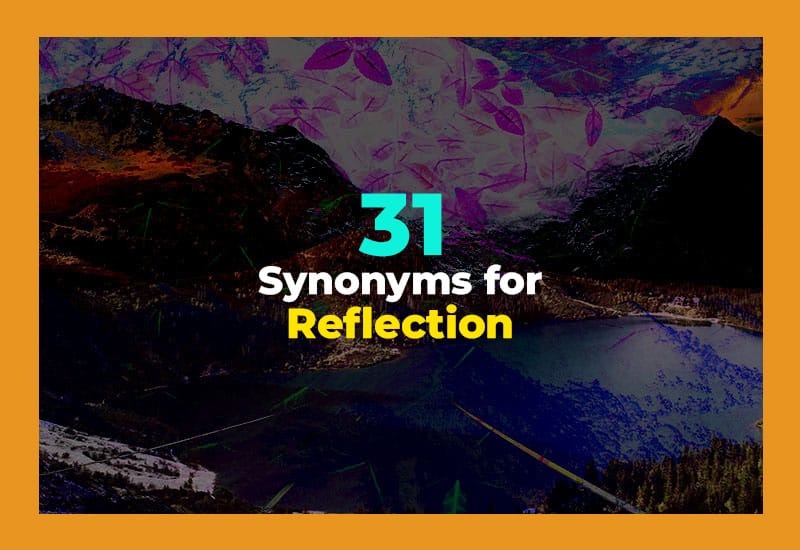You know when you stop and think about something, like what happened during the day or how you feel? That's called reflection. It's like looking into a mirror, but inside your mind! Sometimes it's fun, sometimes it helps solve problems. In this blog, I'm going to share 31 simple words that mean the same as reflection. I'll also tell you what they mean with easy examples, so you can use them like a pro. Ready? Let's jump in and explore these cool words together!
1. Thought
Thought means when you use your mind to think about something. For example, when you're deciding what to eat or remembering a fun day, you are having thoughts. It's like your brain is working to understand or solve things. We all have many thoughts every day. When you think about a problem or a happy memory, that is reflection too. So, thought is the simplest way to say reflection. Next time you pause and think, you can say you are having a good thought!
2. Consideration
Consideration means thinking carefully before you make a choice. For example, if you are choosing a gift for a friend, you take time to think about what they like. That is consideration. It shows respect and care for the person or situation. When you reflect by weighing your options or feelings, you are giving consideration. It's a more serious and kind way to think deeply about something before acting.
3. Meditation
Meditation is when you sit quietly and focus your mind. You might close your eyes and breathe slowly. People use meditation to calm down and think clearly. For example, before a test, some students do meditation to feel less worried. Meditation helps you reflect by letting your thoughts come and go without stress. It's a peaceful way to understand yourself better and find answers inside your mind.
4. Contemplation
Contemplation is slow and deep thinking about something important. Imagine you are looking at the stars and thinking about your dreams. That is contemplation. It's like reflection but slower and deeper. When you contemplate, you give yourself time to understand your feelings or big ideas. This helps you make good decisions or feel calm. Contemplation is a thoughtful way to spend time with your own thoughts.
5. Pondering
Pondering means thinking about something for a long time. For example, when you're trying to solve a hard puzzle, you might ponder over the pieces. It means you are not rushing but really giving your brain time to work. Pondering is a kind of reflection where you carefully weigh all sides before choosing what to do. It's like your mind is on a slow walk, looking at all the details.
6. Introspection
Introspection means looking inside your own mind to understand your feelings and thoughts. For example, after a fight with a friend, you might think about why you got upset. That is introspection. It helps you know yourself better and learn from your experiences. Introspection is a private kind of reflection where you try to find answers inside your heart and mind.
7. Rumination
Rumination is when you keep thinking about the same thing again and again. Sometimes it's good, like when you're practicing a skill, but other times it can make you worried. For example, if you keep thinking about a mistake at school, that is rumination. It is a form of reflection but can feel tiring if you don't stop. It's important to balance rumination with positive thoughts.
8. Deliberation
Deliberation means thinking carefully about a decision before making it. For example, when a group of friends plans a trip, they talk and think about the best place to go. That is deliberation. It is reflection done with purpose and often with others. Deliberation helps make smart choices because you look at many sides of the problem.
9. Review
Review means looking back at something you did or experienced. For example, after finishing a project, you check your work to see what went well and what can improve. That is a review. It is a way to reflect by learning from the past. When you review, you become better next time by thinking about your actions and results.
10. Observation
Observation means carefully watching or noticing things around you. For example, if you see how plants grow, you are making an observation. Observation is a kind of reflection because it helps you learn from the world. By paying attention, you get new ideas or understand feelings better. Observation helps your mind connect facts with thoughts.
11. Insight
Insight means a sudden understanding of something. For example, when you finally solve a tricky math problem, you have an insight. It is a deep kind of reflection that helps you see the truth or a new idea. Insight feels like a light turning on in your mind. It's special because it helps you grow smarter and wiser.
12. Musing
Musing means thinking quietly about something in a calm and gentle way. For example, sitting by a window and thinking about your favorite song is musing. It's a soft, dreamy kind of reflection where your mind wanders to pleasant or interesting thoughts. Musing is relaxing and helps you enjoy your own ideas without pressure.
13. Deliberateness
Deliberateness means doing or thinking something on purpose and slowly. For example, when you answer a tough question in class, you think with deliberateness to get it right. It is reflection with clear intent. When you are deliberate, you are careful and focused on your thoughts or actions, which helps you avoid mistakes.
14. Self-examination
Self-examination means looking closely at your own thoughts and feelings to understand yourself better. For example, after a day of feeling sad, you ask yourself why. That is self-examination. It's a kind of reflection that helps you grow emotionally and learn what makes you happy or upset. Self-examination makes you stronger by knowing yourself well.
15. Considerateness
Considerateness means thinking about others' feelings before you act. For example, before telling a joke, you think if it might hurt someone's feelings. That is considerateness. It is a caring kind of reflection focused on kindness and respect. When you are considerate, you think deeply about how your actions affect others.
16. Brooding
Brooding means thinking about something that makes you sad or worried. For example, if you keep thinking about a lost toy, you are brooding. It is a heavy kind of reflection that can make you feel down. But sometimes brooding helps you understand your feelings better. It's important to not stay stuck in brooding for too long.
17. Contemplative
Contemplative means spending time thinking quietly about big ideas or feelings. For example, watching a sunset and thinking about life is being contemplative. It's peaceful and slow reflection that helps you feel calm and connected with yourself and the world. Being contemplative is like giving your mind a rest to explore deep thoughts.
18. Muse
Muse is like a thought or idea that stays in your mind and makes you think more. For example, a song might be your muse if it makes you dream or feel inspired. Muse is a special kind of reflection that sparks creativity and new ideas. It's like a little friend in your mind that helps you explore feelings or stories.
19. Speculation
Speculation means guessing or thinking about what might happen in the future. For example, when you wonder who will win a game, you are speculating. It is a fun kind of reflection that lets your mind imagine different possibilities. Speculation helps you plan or get ready for what might come next.
20. Reviewal
Reviewal is the act of checking or looking back at something carefully. For example, a teacher might do a reviewal of your homework to see what you did well. It's similar to review but a bit more formal. Reviewal helps you learn from past actions and get ready for the future by thinking clearly about what happened.
21. Introspectiveness
Introspectiveness means often thinking about your own thoughts and feelings. For example, a quiet person who likes to understand themselves is introspective. It is a deep kind of reflection that helps you grow emotionally and mentally. Introspectiveness helps you solve problems by knowing yourself better.
22. Examining
Examining means looking at something very carefully. For example, a doctor examining a patient checks everything to find the problem. Examining is a careful kind of reflection that helps you understand details better. When you examine your thoughts or actions, you find ways to improve or fix mistakes.
23. Thinking
Thinking is using your brain to understand or decide something. For example, when you do homework, you are thinking. It's the simplest and most common way to say reflection. Thinking happens all day long, from small choices to big questions. It helps you solve problems and learn new things.
24. Consider
Consider means to think about something carefully before you decide. For example, you consider if you want to play outside or do homework first. It shows you are taking your time to make a good choice. Consider is a polite and thoughtful way to say reflection.
25. Mulling
Mulling means thinking about something slowly and quietly. For example, when you mull over a difficult question, you take your time to find the answer. Mulling is a relaxed kind of reflection that helps you understand things better without rushing.
26. Self-reflection
Self-reflection is thinking about yourself—your feelings, actions, and thoughts. For example, after a big game, you think about what you did well and what you can improve. Self-reflection helps you grow and become better in life.
27. Contemplating
Contemplating means thinking deeply about something. For example, you might be contemplating your future or a big decision. It is slow and serious reflection that helps you see things clearly.
28. Pensive
Pensive means being quietly thoughtful, often about something serious. For example, you might look pensive when thinking about a problem. It's a calm kind of reflection that shows you are lost in your thoughts.
29. Thoughtfulness
Thoughtfulness means caring about your thoughts and how they affect others. For example, you show thoughtfulness when you think before speaking. It is a kind and careful kind of reflection.
30. Deliberate thought
Deliberate thought is thinking slowly and carefully on purpose. For example, you use deliberate thought when solving a hard puzzle. It helps you make good decisions by giving your mind time.
31. Analysis
Analysis means breaking down something to understand it better. For example, when you analyze a story, you look at the characters and what they do. It is a detailed kind of reflection that helps you learn deeply.

I hope you enjoyed learning these easy words for reflection. Try using them in your daily talks or writing. They make your thinking sound smart and clear, and you will enjoy sharing your thoughts better!









